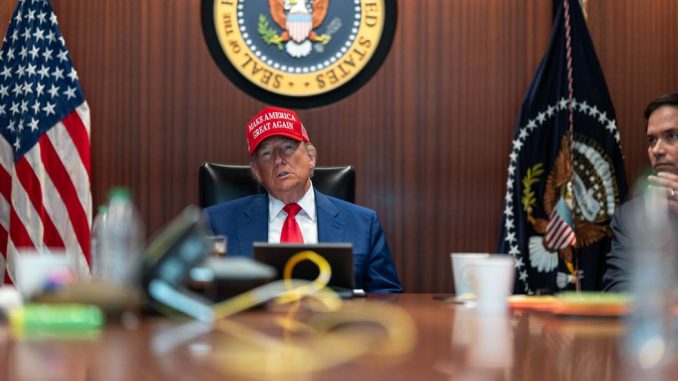
| Published June 22, 2025
Democrats stress that only US Congress – not the president – has the authority to take the country to war.
Following President Donald Trump’s surprise military strikes on Iran’s nuclear facilities, a political and legal firestorm has erupted in Washington and beyond. While some lawmakers applauded the move as a bold step against a rogue regime, others—including members of both parties—condemned it as unconstitutional and potentially illegal. Calls to reconvene Congress and invoke the War Powers Resolution are growing, as world leaders urge de-escalation and warn that the U.S. may have crossed a dangerous line under international law.
🧾 U.S. LAWMAKERS REACT
-
Democrat-led push to rein in the president
Rep. Ro Khanna (D‑CA) urged Congress to reconvene and pass a War Powers Resolution, aiming to withdraw U.S. forces from unauthorized hostilities in Iran unless Congress approves further action -
Bipartisan concern over constitutional authority
Critics like Sen. Tim Kaine, Rep. Thomas Massie (R‑KY), and Rep. Alexandria Ocasio‑Cortez condemned the strikes as unconstitutional, arguing the president overstepped by launching attacks without congressional consent -
Calls for impeachment and legal scrutiny
AOC stated Trump’s actions are “absolutely and clearly grounds for impeachment,” while Sen. Chris Van Hollen Jr. called the president “dragging America into one” -
Republican support with legislative caveats
Senate Majority Leader John Thune and House Speaker Mike Johnson backed the strikes as necessary to curb Iran’s nuclear program. However, isolationist Republicans like Massie and Warren Davidson emphasize that Congress must assert its role
Progressive Caucus chair Casar: It is illegal for Donald Trump to drag America into another endless foreign war.
Congress should immediately pass a War Powers Resolution to block Trump from carrying out an unconstitutional war.
My entire adult life, politicians have promised…
— Chad Pergram (@ChadPergram) June 22, 2025
🌐 GLOBAL LEADERS SPEAK OUT
-
International criticism of legal violation
Oman described the strikes as “illegal aggression,” while the UN Secretary-General called for diplomacy amid rising instability -
Mixed diplomatic messaging
Countries like Chile, Cuba, Egypt, and European nations called for de-escalation, condemning the attacks as violations of sovereignty and international norms
🧑⚖️ LEGAL CONTEXT & WAR POWERS
-
War Powers Resolution in focus
Passed in 1973 to curb unilateral military action by presidents, this law requires reporting within 48 hours and withdrawal without congressional authorization -
New legislation debated
Bills like a “No War Against Iran Act” and newer War Powers resolutions (by Khanna, Massie, Sanders, Kaine) aim to restrict future presidential attacks on Iran—but face low odds in Republican-led Congress
⚠️ RISKS & FUTURE FLASHPOINTS
-
Shift in presidential war-making
The operation marks a notable move away from Trump’s earlier isolationist pledges, potentially resetting norms about executive military authority -
Ensuing congressional showdown
Expect heightened politicization: Democrats gearing toward legal action, constitutional conservatives in both parties demanding oversight, and imminent legislative battles over presidential war powers . -
Potential for broader conflict
Critics warn the unilateral strikes could draw the U.S. into another open-ended Middle East war, repeating past mistakes without a clear strategy for withdrawal or escalation control
 Implications
Implications
🏛️ 1. Constitutional Showdown in Congress
Trump’s unilateral decision to strike Iran has reignited debate over presidential war powers. Lawmakers like Rep. Ro Khanna and Sen. Tim Kaine argue it bypasses constitutional authority, prompting demands for Congress to reassert its role and potentially pass a War Powers Resolution to curb future strikes. This could escalate into a major legal and legislative battle over executive overreach.
⚖️ 2. Questionable Legality Under International Law
Legal scholars and foreign governments have labeled the strike “patently illegal”, citing lack of UN Security Council authorization and absence of an imminent threat. If proven unlawful, it could damage America’s credibility, complicate future coalition-building, and provoke international backlash in forums like the UN or ICC.
🌐 3. Global Diplomatic Fallout
World leaders from Europe, the Middle East, and beyond have called for urgent de-escalation. U.S. allies are divided: some quietly support the move, others fear it undermines diplomacy. The strike could erode the international consensus against Iran’s nuclear ambitions by shifting sympathy toward Tehran.
⚠️ 4. Precedent for Future Military Action
If left unchecked, this action could set a precedent where future presidents—Republican or Democrat—launch military operations without legislative input. That risks making Congress increasingly irrelevant in matters of war and peace, fundamentally shifting the U.S. balance of powers.
🧨 5. Increased Risk of Wider War
The political infighting in Washington may distract from the military reality: Iran has promised to retaliate. The absence of a unified front in U.S. leadership could embolden Iran or its proxies to test U.S. resolve, raising the odds of a regional or even global conflict.
💬 Overall Takeaway:
President Trump’s strike on Iran’s nuclear sites has ignited far more than just explosions beneath a mountain—it’s triggered a storm of political, legal, and global consequences. At home, it reopens deep questions about the limits of presidential power and Congress’s constitutional role in war-making. Abroad, it casts doubt on U.S. commitment to international norms, raising alarms among allies and adversaries alike. Whether history views this as a bold act of deterrence or a reckless breach of legality will depend on what follows—both in Tehran’s response and in Washington’s willingness to confront its own checks and balances.
SOURCES: TOWNHALL – Dems Panic as Trump Obliterates Iran’s Nuclear Threat—Push War Powers Stunt While World Applauds
FORBES – Trump’s Strike On Iran Draws Criticism From Democrats—World Leaders Call For De-escalation
AL JAZEERA – ‘Patently illegal’: Critics dispute legality of Trump’s Iran strikes





Be the first to comment